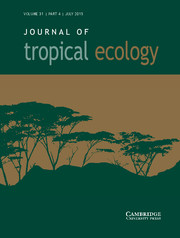Crossref Citations
This article has been cited by the following publications. This list is generated based on data provided by
Crossref.
Rockwell, Cara A.
Kainer, Karen A.
Staudhammer, Christina L.
and
Baraloto, Christopher
2007.
Future crop tree damage in a certified community forest in southwestern Amazonia.
Forest Ecology and Management,
Vol. 242,
Issue. 2-3,
p.
108.
Griscom, Bronson W.
Daly, Douglas C.
and
Ashton, Mark S.
2007.
Floristics of bamboo-dominated stands in lowland terra-firma forests of southwestern Amazonia1.
The Journal of the Torrey Botanical Society,
Vol. 134,
Issue. 1,
p.
108.
Klimas, Christie A.
Kainer, Karen A.
and
Wadt, Lúcia H.O.
2007.
Population structure of Carapa guianensis in two forest types in the southwestern Brazilian Amazon.
Forest Ecology and Management,
Vol. 250,
Issue. 3,
p.
256.
Gagnon, Paul R.
and
Platt, William J.
2008.
MULTIPLE DISTURBANCES ACCELERATE CLONAL GROWTH IN A POTENTIALLY MONODOMINANT BAMBOO.
Ecology,
Vol. 89,
Issue. 3,
p.
612.
Waldram, Matthew
2008.
Breeding Biology of Ranitomeya biolat in the Tambopata Region of Amazonian Peru.
Journal of Herpetology,
Vol. 42,
Issue. 2,
p.
232.
Nogueira, Euler Melo
Nelson, Bruce Walker
Fearnside, Philip Martin
França, Mabiane Batista
and
Oliveira, Átila Cristina Alves de
2008.
Tree height in Brazil's ‘arc of deforestation’: Shorter trees in south and southwest Amazonia imply lower biomass.
Forest Ecology and Management,
Vol. 255,
Issue. 7,
p.
2963.
Rother, Débora C.
Rodrigues, Ricardo R.
and
Pizo, Marco A.
2009.
Effects of bamboo stands on seed rain and seed limitation in a rainforest.
Forest Ecology and Management,
Vol. 257,
Issue. 3,
p.
885.
Olivier, Jean
Otto, Thierry
Roddaz, Martin
Antoine, Pierre-Olivier
Londoño, Ximena
and
Clark, Lynn G.
2009.
First macrofossil evidence of a pre-Holocene thorny bamboo cf. Guadua (Poaceae: Bambusoideae: Bambuseae: Guaduinae) in south-western Amazonia (Madre de Dios — Peru).
Review of Palaeobotany and Palynology,
Vol. 153,
Issue. 1-2,
p.
1.
Veldman, J.W.
Mostacedo, B.
Peña-Claros, M.
and
Putz, F.E.
2009.
Selective logging and fire as drivers of alien grass invasion in a Bolivian tropical dry forest.
Forest Ecology and Management,
Vol. 258,
Issue. 7,
p.
1643.
Franklin, Donald C.
Prior, Lynda D.
Hogarth, Nicholas J.
and
McMahon, Clive R.
2010.
Bamboo, fire and flood: consequences of disturbance for the vegetative growth of a clumping, clonal plant.
Plant Ecology,
Vol. 208,
Issue. 2,
p.
319.
Porter, Leila M.
and
Garber, Paul A.
2010.
Mycophagy and its influence on habitat use and ranging patterns in Callimico goeldii.
American Journal of Physical Anthropology,
Vol. 142,
Issue. 3,
p.
468.
von May, Rudolf
Jacobs, Jennifer M.
Santa-Cruz, Roy
Valdivia, Jorge
Huamán, Jusmell M.
and
Donnelly, Maureen A.
2010.
Amphibian community structure as a function of forest type in Amazonian Peru.
Journal of Tropical Ecology,
Vol. 26,
Issue. 5,
p.
509.
Smith, Maira
and
Nelson, Bruce Walker
2011.
Fire favours expansion of bamboo-dominated forests in the south-west Amazon.
Journal of Tropical Ecology,
Vol. 27,
Issue. 1,
p.
59.
Montti, Lía
Campanello, Paula I.
Gatti, M. Genoveva
Blundo, Cecilia
Austin, Amy T.
Sala, Osvaldo E.
and
Goldstein, Guillermo
2011.
Understory bamboo flowering provides a very narrow light window of opportunity for canopy-tree recruitment in a neotropical forest of Misiones, Argentina.
Forest Ecology and Management,
Vol. 262,
Issue. 8,
p.
1360.
Veldman, Joseph W.
and
Putz, Francis E.
2011.
Grass-dominated vegetation, not species-diverse natural savanna, replaces degraded tropical forests on the southern edge of the Amazon Basin.
Biological Conservation,
Vol. 144,
Issue. 5,
p.
1419.
Montti, Lía
Campanello, Paula I.
and
Goldstein, Guillermo
2011.
Flowering, die-back and recovery of a semelparous woody bamboo in the Atlantic Forest.
Acta Oecologica,
Vol. 37,
Issue. 4,
p.
361.
Frolking, Steve
Milliman, Tom
Palace, Michael
Wisser, Dominik
Lammers, Richard
and
Fahnestock, Mark
2011.
Tropical forest backscatter anomaly evident in SeaWinds scatterometer morning overpass data during 2005 drought in Amazonia.
Remote Sensing of Environment,
Vol. 115,
Issue. 3,
p.
897.
Larpkern, Panadda
Moe, Stein R.
and
Totland, Ørjan
2011.
Bamboo dominance reduces tree regeneration in a disturbed tropical forest.
Oecologia,
Vol. 165,
Issue. 1,
p.
161.
Vinha, Daniella
Alves, Luciana F.
Zaidan, Lilian B.P.
and
Grombone-Guaratini, Maria T.
2011.
The potential of the soil seed bank for the regeneration of a tropical urban forest dominated by bamboo.
Landscape and Urban Planning,
Vol. 99,
Issue. 2,
p.
178.
Feldpausch, T. R.
Banin, L.
Phillips, O. L.
Baker, T. R.
Lewis, S. L.
Quesada, C. A.
Affum-Baffoe, K.
Arets, E. J. M. M.
Berry, N. J.
Bird, M.
Brondizio, E. S.
de Camargo, P.
Chave, J.
Djagbletey, G.
Domingues, T. F.
Drescher, M.
Fearnside, P. M.
França, M. B.
Fyllas, N. M.
Lopez-Gonzalez, G.
Hladik, A.
Higuchi, N.
Hunter, M. O.
Iida, Y.
Salim, K. A.
Kassim, A. R.
Keller, M.
Kemp, J.
King, D. A.
Lovett, J. C.
Marimon, B. S.
Marimon-Junior, B. H.
Lenza, E.
Marshall, A. R.
Metcalfe, D. J.
Mitchard, E. T. A.
Moran, E. F.
Nelson, B. W.
Nilus, R.
Nogueira, E. M.
Palace, M.
Patiño, S.
Peh, K. S.-H.
Raventos, M. T.
Reitsma, J. M.
Saiz, G.
Schrodt, F.
Sonké, B.
Taedoumg, H. E.
Tan, S.
White, L.
Wöll, H.
and
Lloyd, J.
2011.
Height-diameter allometry of tropical forest trees.
Biogeosciences,
Vol. 8,
Issue. 5,
p.
1081.




